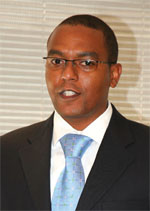Banco Africano de Investimentos: Increasing the Pace - Angola’s Revival
From the remains of a devastating civil war, Angola has become one of Africa’s leading economies. José de Lima Massano, CEO of Banco Africano de Investimentos explains how his bank is at the forefront of the renaissance.
The Angolan economy is the second fastest growing in Africa and one of the most dynamic in the world. Driven primarily by oil production, the country became a member of OPEC in December 2006 and is China’s biggest supplier of oil. The economy grew 18% in 2005, 26% in 2006 and 17.6% in 2007 and is expected to stay above 10% for the rest of the decade. This incredible pace of growth follows a 27- year-long civil war.But the situation is changing and the economy is moving fast says José de Lima Massano, CEO of Banco Africano de Investimentos (BAI).
The country's banking sector used to be comprised of two state-run banks but Massano says Angolans felt it was time for an independent bank to offer an alternative. Set up 12 years ago, BAI is independently controlled, with 8.5% owned by state-owned oil giant Sonangol and 1.5% owned by the Angola National Diamond Company. ‘The aim was to establish an investment bank, but the immediate opportunity was to concentrate on commercial banking and grow that side of the business,’ says Massano. ‘80% of our business is with the country’s corporations, but the original mission remains the same.’ And it’s some mission.
Towards the end of 2007, BAI raised $1 billion for the government’s reconstruction of the nation’s infrastructure, with investors coming from South Africa, Portugal and the UK. It was one of the largest transactions ever by an African bank, notes Massano, but it did not stop there. Deals completed last year included a $400 million loan to the Ministry of Finance for road building and a $150 million loan to Sonangol. There are further deals in the pipeline planned for 2009, worth around $2.5 billion.
Massano says the country is witnessing a period of unprecedented peace, and the fruits of this are reflected in the economic revival. ‘We have elections going on here,’ he says. ‘In the past, that would have meant everything stopped. No deals would be done; everyone would wait and see the outcome of the election. But today, it’s business as usual. The political debate is being conducted in a very polite manner and business is continuing, investments are still being made and decisions being taken.’
Moving forward
Massano believes Angola's hard days are behind it and progress is being made. ‘It’s time for people to look at Angola with different eyes,’ he says. ‘Angolans realise that this is the time to consolidate on the peace and on the potential for the country. We have enormous natural resources but the infrastructure requires investment and hard work, but it’s starting to happen.’
Massano admits it is a long process, but BAI and the other banks in the country are expanding at record rates. BAI has doubled its number of branches in the past two years, consolidated its activity in Europe through BAI Europa Bank and is opening a new bank in Cape Verde as well as strengthening its position in Brazil, through BPN Brazil. In 2007, BAI’s total assets grew 58% to $3.6 billion, and the same rate of growth is expected in 2008.
Internet bank access, although available, is still limited, Massano says, but BAI and others are making investments in this infrastructure. More people are using debit and credit cards in the country, with BAI the first to introduce Visa credit cards last year.
‘Remote areas still have communications problems, of course,’ he says, ‘but the investments are being made and will continue to be made. We certainly haven’t finished.’
The investment opportunities in the country include telecoms, mining, civil construction, public works and agriculture, and BAI is continuing to develop its relationships with banks overseas to help raise finance in the international market whenever needed.
In the banking sector, BAI is conscious of complying with global best practices and Massano says there has been a continuous investment in bringing out the best from its professionals. His message to potential investors simple: ‘Open your eyes and mind to the opportunities here in Angola. Come and see for yourself.’

